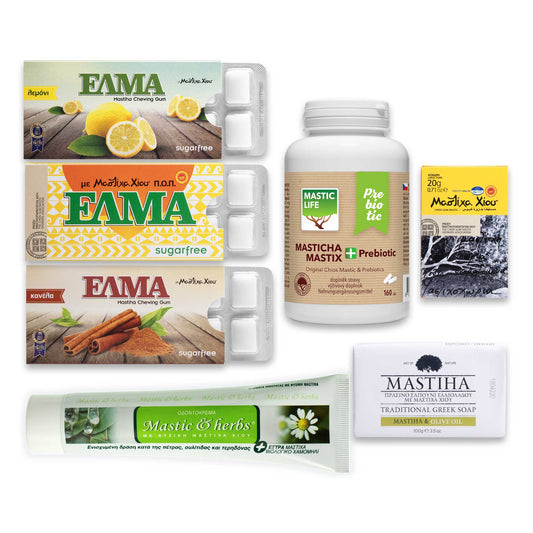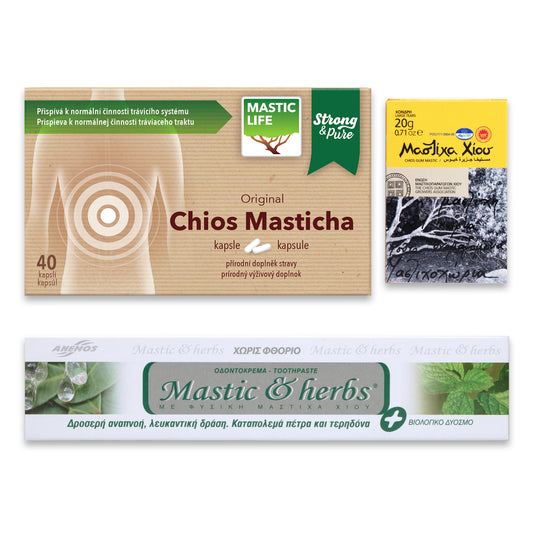Gastritis: Symptoms, Forms, Causes and Treatment
Anyone who suffers from annoying heartburn inevitably wonders where the discomfort could come from. Sometimes an inflammation of the gastric mucosa is behind the suffering in the oesophagus. Besides heartburn, an inflammation of the stomach lining, also called gastritis, can cause symptoms such as stomach pain, nausea or even vomiting. But what are the causes of gastritis? What are the different forms? And above all: What helps against gastritis?
About the topic: Gastritis – Symptoms, Forms, Causes and Treatment
- Definition
- Acute gastritis
- Chronic gastritis
At a glance: Gastritis ...
- ...describes the inflammation of the stomach lining.
- ...can occur as an acute or chronic form.
- ...is characterised by heartburn, stomach pain, loss of appetite and flatulence.
- ...can often be treated well at the beginning of the disease with home remedies, herbal remedies and the avoidance of triggering factors.
- ...is often difficult to recognise when it becomes chronic and tends to lead to vague abdominal pain and general discomfort.
- ...is a case for the doctor, as he or she can determine the cause and initiate appropriate treatment.
What is gastritis?
Gastritis is an inflammation of the stomach lining. Like a coat, the stomach lining lines the inside of the stomach. In addition, cells of the mucosa produce the gastric acid needed for digestion.
The tasks of gastric acid
The enzymes in stomach acid help to digest food into its individual components and digest it. In addition, due to its acidic pH value, gastric acid is able to kill pathogens.
However, the acid is also very aggressive: if too much gastric acid is produced or if the stomach lining is damaged and weakened for various reasons, the acid can attack mucosal cells and gastritis develops. Doctors differentiate between an acute and a chronic form of gastritis.
Acute gastritis: The symptoms
Acute gastritis usually does not go unnoticed. Particularly after meals, there is suddenly severe pain in the stomach area, which sometimes radiates to the back. People often feel nauseous and have to vomit.
Other symptoms of gastritis may include:
- Sensitivity to pressure in the stomach when palpating the abdomen.
- Loss of appetite
- Bloating
In some cases, the large amount of acid in the stomach can cause heartburn or acid regurgitation.
Causes of acute gastritis
The reason for gastritis is usually the excessive production of stomach acid. There are various factors that can lead to this, for example:
- prolonged stress
- excessive alcohol consumption
- cigarette smoking
- spicy or greasy foods
- large amounts of coffee
But there may also be damage to the stomach lining, which makes it particularly easy for the acid to attack it. Drugs - especially so-called non-steroidal anti-inflammatory drugs (anti-inflammatory painkillers), for example with the active ingredient acetylsalicylic acid - damage the stomach lining when taken regularly and thus promote gastritis.
How to treat acute gastritis?
As a rule, acute gastritis subsides after a few days. However, to allow the stomach to regenerate undisturbed, you should avoid triggering aspects or risk factors as far as possible. Home remedies can also improve the symptoms:
- Warmth in the form of a hot water bottle on the stomach or a hot bath is pleasant.
- Gentle foods are considered particularly easy to digest and are therefore recommended for gastritis. For example, gruel and rusks are easy to digest. However, you should avoid alcohol, coffee and spicy or fatty foods.
- Herbal teas made from lemon balm, chamomile or fennel can soothe the stomach and relieve pain.
- Special relaxation techniques, such as yoga or meditation, reduce stress and thus possibly contribute to the improvement of gastritis.
- In addition, herbal medicines (for example with angelica root) or medicines from the group of antacids (neutralise stomach acid) can be used. These medicines are available without a prescription at the pharmacy.
Change medicines
If you are taking medicines that may affect the lining of your stomach, you should consult your doctor. He or she may be able to show you a more stomach-friendly alternative.
Symptoms: Chronic gastritis remains undetected for a longer time
In addition to the acute variant, there is also chronic gastritis. Experts suspect that in western countries almost half of those over 50 suffer from chronic gastritis. In contrast to the acute form, the chronic variant runs its course over a longer period of time. Some sufferers experience no symptoms at all - so the disease often goes undetected.
Specific symptoms such as heartburn, flatulence or a feeling of fullness after meals are rather rare. Mostly it is unspecific pain in the upper abdomen or general malaise that indicates chronic gastritis.
Good to know
Even if the signs of chronic gastritis are not too severe, they should be taken seriously. If the symptoms in the upper abdomen recur or last longer than 3 to 4 weeks, it is advisable for those affected to consult a doctor. Prompt treatment of chronic gastritis is important, as otherwise it can develop into, for example, a stomach ulcer (a deep wound in the stomach wall) and bleeding.
Causes of chronic gastritis: Classification into different forms
There are different forms of chronic gastritis, depending on the trigger:
- Type A: Gastritis of this form is a rather rare autoimmune disease that is hereditary. In this disease, the immune system develops defence bodies against cells of the gastric mucosa. The cells are attacked and gradually destroyed. In the course of this form of the disease, there is often a nutrient deficiency because the damaged mucous membrane impairs the absorption of nutrients.
- Type B: This form is much more common than type A. Approximately 80 to 90 percent of all chronic gastritis cases are of this type. Gastritis is caused by an infection with the bacterium Helicobacter pylori. The bacterium spreads from person to person, presumably via saliva, vomit or faeces. The exact route of transmission (oral-oral, gastral-oral and/or faecal-oral) has not yet been conclusively researched.

- Type C: The chemical-toxic form of gastritis is often caused by long-term ingestion of anti-inflammatory painkillers or the pathological reflux of bile (from the intestine into the stomach).
- Type D: Some doctors distinguish a fourth type of gastritis. This includes various other inflammations of the stomach mucosa that are triggered by rather rare causes, for example chronic inflammatory gastrointestinal diseases such as Crohn's disease.
About the bacterium Helicobacter pylori
The bacterium Helicobacter pylori is the cause of a large proportion of gastritis. Helicobacter pylori infection is the second most common infectious disease worldwide: more than 50 percent of the population carry Helicobacter pylori - mostly unnoticed. Due to its special spiral shape, the bacterium nests particularly easily in the uppermost layer of the gastric mucosa. There it neutralises the gastric acid in its immediate vicinity. The pathogen often remains undetected for a long time, but in the long term it leads to the natural regulation of stomach acid production being disturbed. As a result, chronic gastritis can develop.
Do you want to test yourself for the infection with H. Pylori? Test yourself in the privacy of your home with this stool (or blood) test. You'll know the result in 10 minutes.
Chronic gastritis: The diagnosis
The specialist for diseases of the digestive tract is the gastroenterologist. First, he or she will ask the patient about his or her symptoms and carefully palpate the stomach with his or her hands to find out whether there is increased sensitivity to pressure.
During a gastroscopy, the gastroenterologist can also examine the stomach lining. During the 10- to 15-minute examination, the doctor carefully pushes a thin tube through the oesophagus into the stomach. A small camera is attached to the end of the instrument, through which, for example, pathological changes in the stomach lining and inflammations become visible.
In addition, the specialist has the option of taking a small tissue sample of the mucous membrane during the gastroscopy. This can then be sent to a laboratory to be tested for bacteria and possibly provide information about the cause of the gastritis.
Treatment of chronic gastritis
In chronic gastritis, treatment depends on the cause. In type A gastritis, the trigger - i.e. the autoimmune disease - cannot be treated causally. Instead, the doctor often prescribes vitamin B12 supplements, because the impaired absorption of nutrients often leads to a deficiency of the vitamin.
The doctor usually treats type B gastritis by prescribing proton pump inhibitors (PPI). These medicines inhibit the production of stomach acid. In addition, the doctor prescribes antibiotics against the Helicobacter bacteria.
The most important thing to do if you have type C gastritis is to avoid the medicine that caused the irritation. If medicines have triggered the inflammation, you should always discuss an alternative therapy with your doctor. He or she can also recommend medicines that protect the stomach.
There is no one-size-fits-all treatment for type D gastritis, as there are many different possible causes for this type of gastritis and a treatment option must always be sought on an individual basis.
So!
As with acute gastritis, you should also avoid coffee, alcohol and nicotine as well as fatty, hard-to-digest food in the case of the chronic form in order not to further irritate the stomach lining.
| Category | Information |
|---|---|
| What is gastritis | Inflammation of the stomach lining; stomach acid can damage the mucosa if overproduced or if the lining is weakened. |
| Types |
Acute – sudden pain, nausea, vomiting, bloating, loss of appetite Chronic – often symptomless, can be type A/B/C/D (autoimmune, H. pylori, chemical-toxic, other) |
| Symptoms | Stomach pain, heartburn, bloating, nausea, vomiting, loss of appetite, tenderness in the stomach area |
| Causes (Acute) | Excess stomach acid, stress, alcohol, smoking, spicy/fatty foods, coffee, NSAID medications |
| Causes (Chronic) |
Type A: autoimmune Type B: H. pylori infection Type C: long-term NSAID use, bile reflux Type D: other rare causes |
| Treatment / Recommendations |
Acute: rest, gentle foods, herbal teas, relaxation, antacids if needed Chronic: PPI, antibiotics for H. pylori, vitamin B12 for type A, avoid irritant medications/foods |
| Home Tips | Warm compress, gentle diet (porridge, rusks), herbal teas (chamomile, lemon balm, fennel), yoga/meditation |
| When to see a doctor | Symptoms persist >3–4 weeks, severe pain, suspicion of ulcers or bleeding |
FAQ – Gastritis
What are the symptoms of gastritis?
Gastritis symptoms include heartburn, stomach pain, nausea, vomiting, loss of appetite, bloating, and sensitivity to pressure in the stomach area. Acute gastritis often causes sudden severe stomach pain, while chronic gastritis symptoms may be vague or absent.
What causes gastritis?
Gastritis can be caused by excessive stomach acid, prolonged stress, alcohol, smoking, spicy or greasy foods, certain medications like anti-inflammatory painkillers, and infection with the bacterium Helicobacter pylori. Chronic gastritis can also be autoimmune or chemical-toxic in origin.
How is gastritis treated?
Treatment depends on the type of gastritis. Acute gastritis can improve with home remedies, avoiding triggers, and gentle foods. Chronic gastritis treatment may include proton pump inhibitors, antibiotics for H. pylori infection, vitamin B12 supplements for autoimmune forms, and avoiding irritant medicines or foods.

Source of text here, source of the picture: Pixabay
Mastic for your gastrointestinal tract
-
 8-week treatment 🗓️
8-week treatment 🗓️Mastic 8 weeks
Regular price £70.00 GBPRegular price£87.00 GBPSale price £70.00 GBPSale -
 60-day treatment 💪
60-day treatment 💪Mastic Gum Extra for 60 days
Regular price £124.00 GBPRegular price£156.00 GBPSale price £124.00 GBPSale -
 Gift set 🎁
Gift set 🎁Mastic „Life with Mastic"
Regular price £52.00 GBPRegular price£57.00 GBPSale price £52.00 GBPSale -
 Gift set 🌿
Gift set 🌿Mastic „Pure Mastic“
Regular price £27.00 GBPRegular price£30.00 GBPSale price £27.00 GBPSale






